- Home
- Shirley McKay
1588 A Calendar of Crime Page 9
1588 A Calendar of Crime Read online
Page 9
‘There is always that.’
‘True. But Mary thinks that it grows graver by the day. How far away it seems,’ Frances said.
‘Aye, thank God.’
But Frances did not look on it like that. ‘How was your commission?’ she asked.
‘Not quite as expected. Lord Sempill, who has the charge of it, has disappeared.’
‘How exciting. Will they want you to find him?’
‘I do not suppose so.’
‘They should. No one is as good at finding things as you.’
He laughed at that. ‘Perhaps. But I would rather be at home.’
Frances let slip the smallest of sighs. She folded Mary’s letter, handing it to him. ‘Read it, if you like. There is a kind of life in it that makes me miss the world.’
‘What? The war with Spain?’ he teased.
‘Not that.’ She considered. ‘Perhaps, even that. London seems so far.’
‘Do you miss your aunt?’
She could not explain how she felt confined and closed within the house. She answered carefully. ‘We were at the mill today. The maids have dressed it up with flowers, in honour of the May. The air was fresh and cool. Tomorrow, if the day breaks fair, I thought of going to the town, with Flora, to see Meg.’
‘With Flora? Is that wise?’ He could not quell the fear. She sensed it in his voice, although he tried to steady it. It welled up like the wind, and all but overwhelmed.
‘Bella Frew walks often through the fields with Billy on her back, tied up in a shawl,’ she reasoned quietly. ‘Or in a little basket, riding at the horse.’
‘That does not sound safe.’ For Frances was not Bella Frew, and Flora was not Billy. He felt himself adrift, helpless to protect them.
‘Gavan Baird has books to take to Matthew Locke. He will walk with us, he says. If you think it well. He will not do so else. So, what do you think?’ Frances looked at him.
The colour in her cheek, the brightness in her eyes, which had been lost a while, returned to hold and still the beating of his heart. ‘I think it will be well,’ he said, ‘if the day is fair. But Gavan need not walk with you. I will go myself.’
When morning broke, he walked with her, and led her horse on foot with Flora in a basket carried at her side, where a gentle sunlight welcomed his small child to blossom in the breeze. When at last he left them in the leafy South Street, in his sister’s house, he felt light at heart, returning to St Salvator’s more settled and at ease than he had been since Candlemas.
IV
Giles was in a humour that was brittle and capricious, quite unlike his usual one. ‘There have been advancements,’ he announced. ‘Lord Sempill has been found. And a man has been arrested, on suspicion of his murder.’
‘Then I am sorry to hear it,’ said Hew. ‘Have you examined the corpse?’
‘What corpse? Did I say, at all, that there was a corpse?’
‘You said he had been found,’ Hew pointed out, confused.
‘Aye, and so he has. He is in this room. I wonder, exceedingly, that you do not see him. He was brought to me this morning in a bag. I found for him the comfort of a cage.’
The injured rook was in a cage of wire, suspended from the ceiling by a hook. ‘You do not mean—’ Hew said.
Giles circumvented him. ‘I do not mean at all. Wherefore should I mean,’ he said, ‘when all the world is mad? What is meaning for? This, I am assured, is the spirit of Lord Sempill transfigured in a bird. It was brought to me this morning by Carnegie of Colluthie, who had it from a boy who brought it him last night. The boy is a bursar in the first class at St Leonard’s. He has sworn, by all that is holy and much that is not, that Lord Sempill turned into this creature yesterday, sometime in the night.’
‘And Colluthie believed him?’
‘Of course he believed him. He wanted to believe. His terror at the thing I cannot overstate; it is equalled only by his joy in it.’
‘Why, then,’ wondered Hew, ‘has he brought it here?’
‘Because he is too cowardly to keep it in the house. He says he hears that we are good at solving mysteries. I telt him it was death we dealt in. He was not deterred. He expects that in due course Lord Sempill must revert to his habitual form, relying on us then to cry him for a witch.’
The bird began to flutter feebly at the bars. ‘I do not think Lord Sempill will fit inside this cage. It may prove an impediment,’ Hew said.
Giles conceded dryly, ‘That is a concern. Sad wretch. No doubt there is a mistress rook, and chicks.’
Hew did not like to think of that. He turned his mind instead to the man who was arrested, asking how the thing had come about.
‘That may be more serious,’ said Giles. ‘He was found in a tavern, wearing Sempill’s coat.’
‘Then,’ Hew concluded, ‘Sempill may be dead; we cannot rule it out.’
‘I fear that is the case. I hoped you might investigate. The suspect is held at the tolbooth. He claims he bought the jacket from the laundress at St Leonard’s, not kenning whose it was. The woman has denied it all, of course.’
‘St Leonard’s once again,’ said Hew, for whom investigation was already under way, taken up as easily as slipping on a coat. ‘Then that would seem to me a likely place to start.’
James Wilkie at St Leonard’s had spent a restless night. He did not regret sending Robin Grubb to Colluthie at the West Port, without Henry Balfour to second his report. Robin, he believed, had an air of innocence that was pure and credible, almost a simplicity, for clever boys – and Robin was a clever boy – were sometimes also fools. Lord Balfour’s son was clever of a different kind, worldly and sophisticate, in no way a sop. Robin was the safest choice to offer up the bird; the pity was that he had told a partial truth. Robin had borne witness that he had seen Lord Sempill transform into the rook, between St Mary’s gate and St Leonard’s wood. But if he told a lie, it was only of the place, and if he had stopped short, in his natural modesty, of speaking of the dance, or of Sempill’s nakedness, which details would provoke a further stream of questions, it was to the good. As to the transformation, Robin Grubb believed – honestly believed – that this was what they all had witnessed in the college courtyard. This was no wonder at all, for Wilkie believed it himself. He had further evidence, beyond that of his eyes and unbeknownst to Robin, that cemented that belief. And Colluthie had believed it, on less compelling evidence, because he wanted to. None of that concerned him. Sempill had been caught, and the exact location where he had transfigured was an incidental in the grander scheme.
It was the washerwoman who had pricked at Wilkie’s conscience, and had ruined his sleep. She had found Sempill’s clothes, lying in a place where they had not thought to look, and had sold them on. Now the man that bought them was lawfully detained, accused of Sempill’s death. The laundress had quite sensibly denied the part she played, which had left James Wilkie standing in a quandary. If he did not speak out, then it was quite likely that a man would hang because he bought a coat. But if he gave support to his story of the laundress, they might hang her too, as complicit in the act. If he told the truth, the whole truth must come out – for that the clothes were Sempill’s could not be denied – and then the college and its principal were folded in as deep as a body lapped in the curtains from his bed. He shuddered to imagine where those curtains might be now.
Wilkie saw one straw, one slender chance to extricate the college from the horror that pursued. There was one man had the skill to break into the truth, and that man doubtless also had the cunning to conceal it. That man was Hew Cullan. Hew Cullan was a graduate and master of St Leonard’s; he had been a regent there, a friend of Robert Black’s. He held in his heart certain loves and loyalties, from before Wilkie’s time, which could be worked on now. More recently than that, he had been married, to his English bride, in the college kirk; and more closely still, Wilkie had gone on a frost-ridden night to deliver the sacrament to his first child, when no one had believed the infant wou
ld survive. Hew Cullan was the man who was wanted now; the principal received his intervention gladly, which once he had anticipated with a sense of dread. Desperate times called for dark measures, he consoled himself.
And so, when Hew arrived, he did not have to trouble to expose the lie. Wilkie laid all bare before him – astonishingly bare – before he had to ask.
‘If you can find a way,’ said Wilkie, once the tale was told, ‘to free the man who had the luck to buy Lord Sempill’s coat without reference to the college, I would be obliged to you.’ His story had acquired an air of indignation, as though St Leonard’s College was the injured party, not the man himself. Sempill was the villain, on whatever count.
‘And how might I do that?’ said Hew, struggling to move on from the picture of the dance, which Wilkie had been painting vivid in his mind.
‘It will not be hard. You need only prove that Sempill is the bird, and all will be resolved. The matter of his clothes is an accidental. If Sempill is the rook, then he is not dead. And if he is not dead, then he has not been killed.’
‘If Sempill is the rook,’ said Hew, whose echo had no hint in it of Wilkie’s own conviction, ‘how do you propose I prove that is the case?’
Wilkie said, ‘With this. The same bag of tricks with which he was disfigured.’ He unlocked his desk, and took out Sempill’s purse. ‘You need not say, of course, where you came upon it. Can you find a way to put this matter right,’ he begged, as Hew stood up to leave.
‘I will not let a man be damned without a fight, who has done no wrong,’ Hew returned ambiguously. Wilkie seized upon it, single in his purpose.
‘So did I believe. Our hopes depend in you.’
Returning through the Market Street, Hew called at the tolbooth, where he asked to see the prisoner. Here he was well known for assistance he had given to the crownar, Andrew Wood. Sir Andrew Wood was absent still, on business in Dundee, where he had bought a house. He was in the process of retiring from his office, and had not yet found the time, through his most attentive and exacting methods, to determine if the suspect should be sent for trial. Hew spoke in his absence to a burgh magistrate, who had the delinquent safely in his charge.
‘See him, if you like. Talk to him, if you will. And if you can stop his greetin’ I will be obliged to you,’ the magistrate replied. ‘He has been wailing half the night.’
The drunken man had woken to a sober melancholy, and his face was mottled heavily with tears. His mouth and throat were dry, and it cost Hew fourpence to procure a drink for him, before he could determine what it was he said. He had been a journeyman for nine years to a carpenter, a timmerman at sea. His master had passed on and left to him a legacy, with which he was intending now to settle down, and take a wife on land. He had in his mind a lassie from the town, whom he had had his eye on for a while. He had not thought, before, that she would stoop to look at him. But with his newfound wealth, he hoped he had a chance with her. He had bought the coat to build upon that chance, for it was such a coat a gentleman would have; by wearing it, he hoped, the lass might think him one. He had it from a friend, whose mother did the washing for St Leonard’s College, and claimed it was a gift from the college principal, a gentleman, that was. And it was dear enough, he sniffed, without the devil took him also for the price of it; he had no idea it was a dead man’s coat. ‘They kenned it was, I doubt. And doubtless they had set upon and killed that man the gither, for baith of them deny they ever saw it now. And now,’ the timmerman concluded his distressing tale, ‘the crownar is to come and bring wi’ him the pilliewinks, an’ I am meant to tell him where the corpse is put. And how will I dae that, when I do not ken?’
‘Is that what they have telt you?’ Hew said sympathetically. ‘I would not give it heed. I know the crownar well, and to my kenning he does not resort to torments like the pilliewinks; his methods are more subtle, though they are as keen. Tell him, when he comes, that you have Hew Cullan now to speak in your defence, and he must come to me. He will not like it much. We are combaters of old. But he will hear your plea.’
‘Combaters, you say?’ The word held out no hope. The timmerman would have preferred it if they had been friends.
‘Trust in it,’ said Hew. He asked the burgh magistrate if he might borrow Sempill’s coat, to help in his inquiries. The man did not seem sure.
‘Evidence, that is. Tis here to show the crownar.’
‘I do not mean to take it further than St Salvator’s, where Doctor Locke will look at it for any trace of blood. It will help your case,’ Hew promised.
‘Aye, then, very well. You maun sign your name for it,’ the magistrate agreed. ‘What news from Doctor Locke? Has he found the body?’
Hew said enigmatically, ‘Though some believe he may have done, I am persuaded not.’
He took Lord Sempill’s coat with him to St Salvator’s, to hang up on a peg not far from the rook. ‘For when he wants to change,’ he said.
Giles raised an eyebrow. ‘Seriously?’
‘Not seriously, in truth. Ah, I do not know. The truth is that, whatever is the truth, Lord Sempill is not found, and I have no inkling where he is.’ Hew told Giles the tale he brought back from St Leonard’s, ending with the pocket that was found in the latrines, which he opened up to show what was inside: a stub of tallow candle and a pot of cream. ‘What do you make of that? Wilkie is convinced it is the flying ointment Sempill used to transform himself. The candle he believes was lit to cast the charm. Why he chose St Leonard’s to effect this transformation, Wilkie cannot tell. What do you think? Is it flying cream?’
Giles sniffed at the contents of the pot. ‘Meg is better placed than I am to tell you.’
‘Because she is a witch?’ Hew inquired facetiously. It struck, none the less, a bitter kind of note, which Giles was quick to blow away.
‘Because she is an expert in the herbal medicines of the natural world. She may ken what is in it. James Wilkie is not wrong when he supposes that magicians deal in diverse strange and secret ointments. Some such are composed of arsenic and antimony. They may cause a man to think that he can fly. He cannot fly, of course. And as to turning him into a bird – well, we see where such illusions sow their seed, and propagate,’ he said.
Hew turned to the rook. ‘What say you, my lord? Shall we dip your feathers in this fantastic ointment, to see if you turn back? For God knows how to find you by another scheme.’
The bird did not fare well in captivity. After several hours, it had ceased to beat its wings against the bars of the cage, and sank into a corner, dazed at the futility. It refused to countenance the smallest scrap of food, or to drink the water that was offered in a cup. It had plucked three feathers from its broken breast, allowing them to flutter plaintive to the ground. Hew picked them up, and returned them to the cage.
‘Poor prisoned creature,’ murmured Giles. ‘We should let it out.’
‘No.’
‘No? That is not like you, Hew.’
‘If Lord Sempill is found, if he is alive, then the bird in its cage is the one thing that might save him. We must keep it there, and its refuse too. No matter if it dies. No particle nor part should be suffered to escape.’
‘Ah, I see your mind. Nature is not kind. But how much more upsetting is our work upon her world.’ Giles stripped from its sinews a morsel of meat, and dangled it close to the bird. ‘Feed, little rook. Look to your strength.’
‘There is a man had a coat that did not belong to him, wants your compassion too,’ Hew advised him grimly. ‘Lord Sempill must be found, and both poor wretches freed.’
He took the ointment for his sister to examine in her South Street still room. If Frances was dismayed to see him back so soon, she was reassured to find he would not stay. He kissed his wife and child. ‘Lord Sempill must be left to find himself awhile, for I have I promised Giles to read the second lecture,’ he said. ‘I will return at dinner time to learn what you have found.’
‘You ask a lot,’ said Meg.
> ‘But not too much, of you.’
He departed then, to lecture to the second class, a lightness in his step. Frances said, ‘Tis good to see him occupied. He has not been himself.’
‘He is in his element,’ said Meg. ‘I think he has not been there for a while. The last months have been hard on you both.’
‘He is attentive.’ Frances sighed. ‘He would protect us, sometimes, from imagined threat.’
‘He believes it is his duty to keep you and Flora safe. And he has not the faintest notion how to go about it. He is terrified. Nor can he believe in his good fortune. He does not think that he deserves it. But he will accept it, over time. Now he is content, because he has a crime to solve, and the one thing he is sure of is that you are safe with us. Can I ask you to watch Martha while I take this ointment to examine at the still?’
Frances said, ‘Of course. But can you really tell what compound is inside?’
‘The chance is small, I think. For I am no magician. I will not be long.’
Though Frances gave no sign, the task of watching Martha filled her with disquietude. The servant, Canny Bett, had taken Martha’s brother Matthew to his class with Gavan Baird, and she was left alone. The child was playing outside in the garden; from time to time she ran into its wilds, returning with a leaf, a pebble or a flower. Meg’s gardens stretched out far off to the fields, and were filled with hazards: water butts and bees, thistle clumps and thorns, and enough poison to see off a city. Giles had built a wall around the physic garden, but was there not a space through which a child might slip, as resolutely fey as Martha was? The place was ripe and full of danger; it astonished Frances Hew supposed it safe.
Now and then the child would disappear from sight, and Frances was alarmed. She was caught at a cross; Flora lay asleep in a basket on the floor, and she did not like to leave her daughter in the house, or Martha in the garden, unattended. She called out to the child, and was relieved when Martha Locke came running, with her streaming tangled hair and bare beggar’s feet, for Meg allowed her children to run wild. She tried to settle Martha in her lap, but Martha would not have it, wriggling herself free. She was all limbs a-flailing, like a windmill in the wind, while Flora was lapped up tightly in a package, neat and straight and stiff, with a little placket for her placid face, primly peeping out. Martha was prattling all the while, some fantastic folly of imagination; she lived half her life in an imaginary world. Her brother Matthew Locke was a solid, studious child. But Martha was a creature entirely of her own; her parents had indulged and encouraged her wild flights, and had not taught her that such fantasies were dangerous and wrong. Frances hoped and prayed that Flora would not follow by example; she pictured Flora peaceful at her books or stitching at embroideries, sitting on a cushion on the grass at Kenly Green, underneath the apple trees. She would play the lute, and learn to sing, as Frances did, and they would sing for Hew on winter afternoons, when the lamps were lit, settled by the fire. Here, at home with Meg, she found that she could hope, daring to look forward to that future life, believing in her heart that Flora would grow strong; and understanding Meg had saved the baby’s life, Frances felt ashamed for thinking her at fault. She turned back to the child. ‘Tell me what you play.’

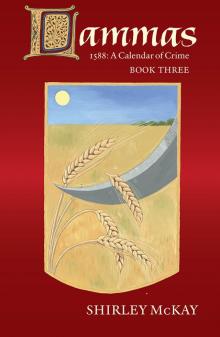 Lammas
Lammas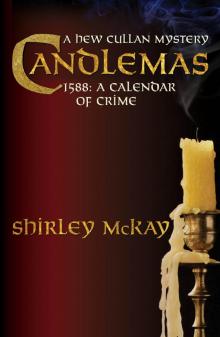 Candlemas
Candlemas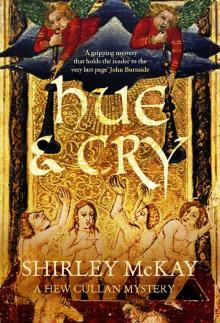 Hue and Cry
Hue and Cry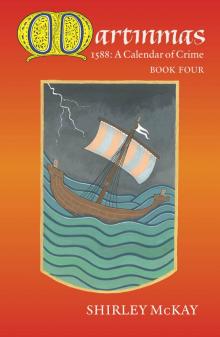 Martinmas
Martinmas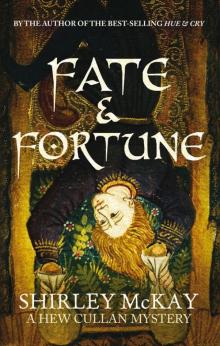 Fate and Fortune
Fate and Fortune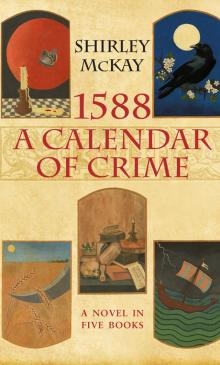 1588 A Calendar of Crime
1588 A Calendar of Crime Time and Tide
Time and Tide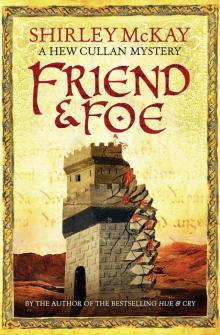 Friend & Foe
Friend & Foe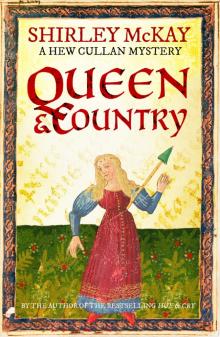 Queen & Country
Queen & Country